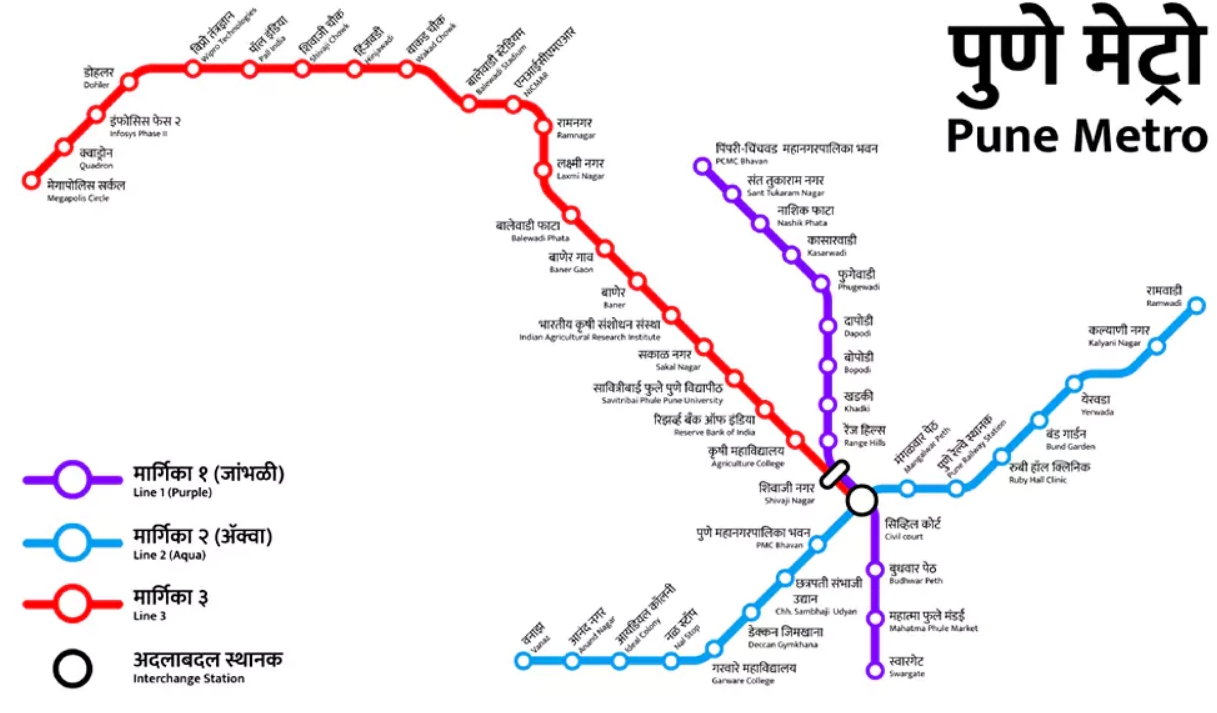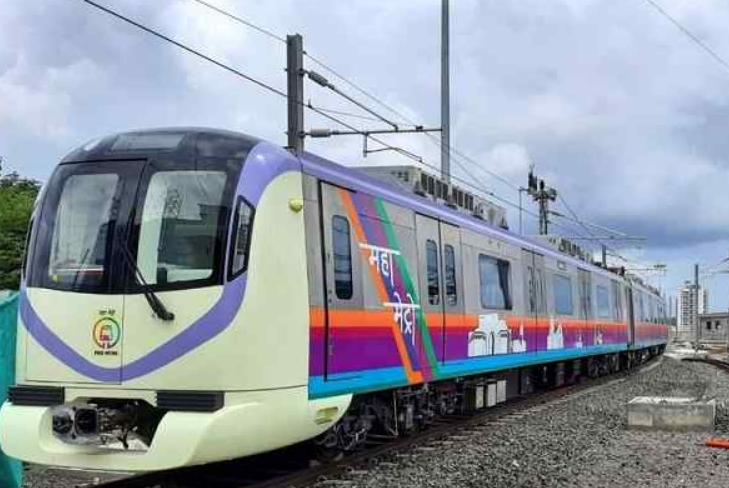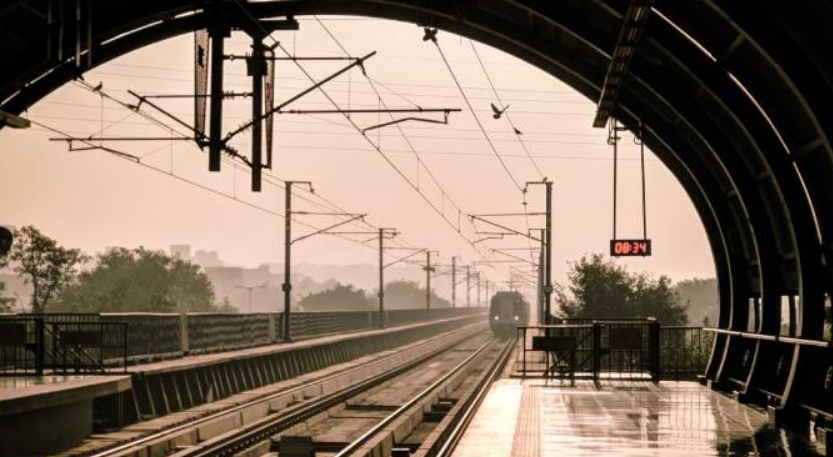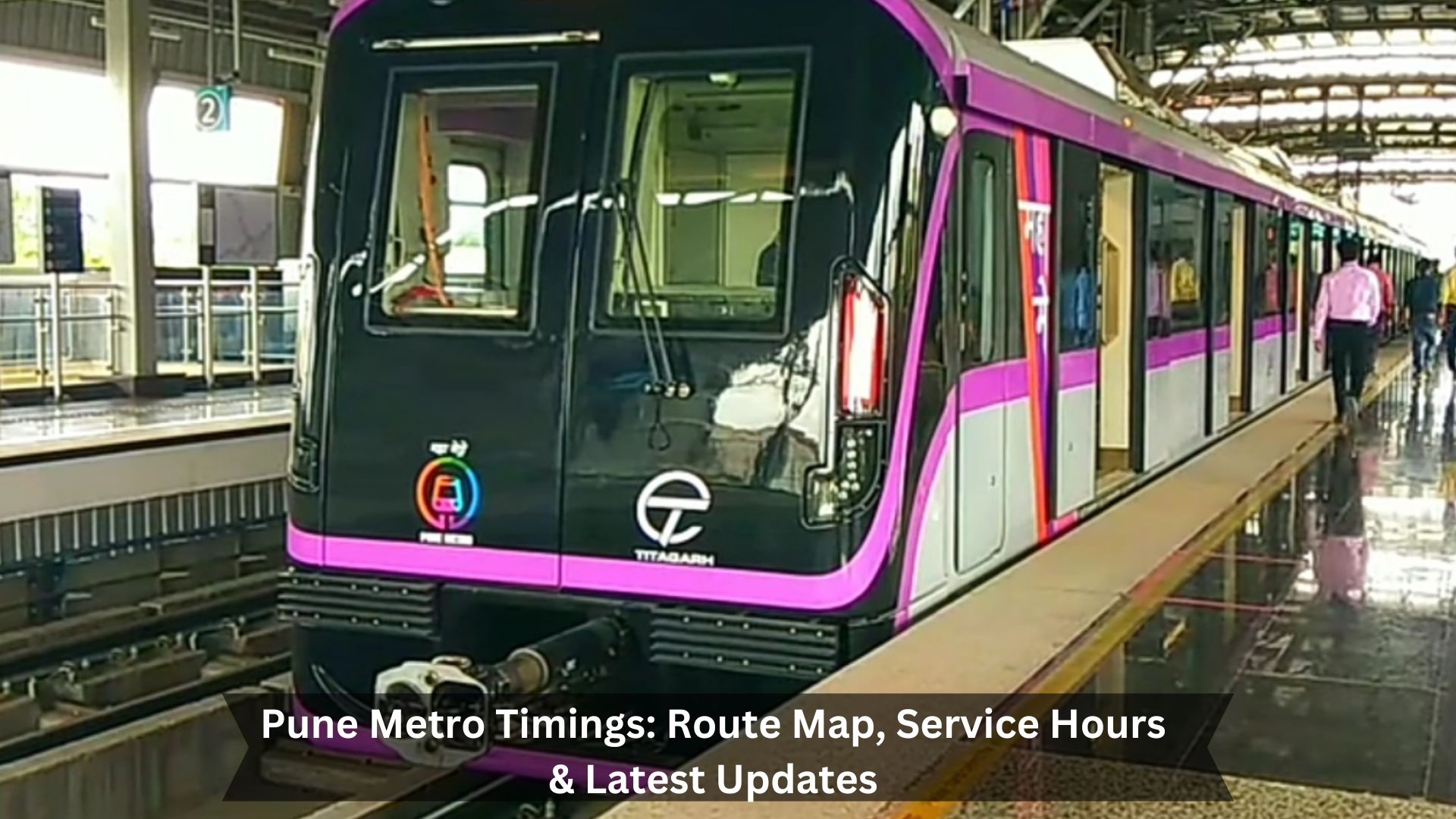Pune is growing fast, and the Pune Metro has been a big help in making it easier to get around and cutting down on traffic jams. Right now, the metro runs from early morning to late evening, which is excellent for people travelling to work daily.
However, some new ideas have been proposed for changing the metro’s times and routes. These changes could help even more people by covering more areas and better fitting with the city’s needs. Let’s talk about these updates. They could change how people travel daily and affect city life overall. If the metro can reach more places and run at times that work better for everyone, it could make getting around Pune much smoother.
Overview of the Pune Metro Rail Project
Specifications for the System

The Pune Metro Rail Project has two lines to make city travel faster and greener. Each line features modern trains and advanced signalling to ensure safe and reliable journeys. The trains are roomy and comfortable, with air conditioning, automated doors, and features for disabled passengers.
Stations are conveniently located near critical neighborhoods and business areas, boosting access and connections across Pune. This project isn’t just about transport; it’s about transforming Pune into a more accessible and eco-friendly city.
Phase 1 of Pune Metro
The first phase of the Pune Metro is a big step in improving the city’s public transport. It has two main lines. The North-South line goes from Pimpri Chinchwad to Swargate and is about 16.59 kilometers long. The East-West line connects Vanaz to Ramwadi and is about 14.66 kilometers long. Together, these lines have 30 stations and cover a lot of the city, making it easier to get around.
The metro uses the latest technology for signaling and communication, which makes the rides safe and efficient. The goal is to reduce traffic jams, reduce pollution, and provide a green option to driving. This should improve life in Pune.
Latest Updates on Pune Metro
Route Map

The Pune Metro has just added two new stations and extended its hours, making it easier for everyone to get around the city. Now, we have Sunshine Junction and Tech Park Terminal. Sunshine Junction helps you switch between different metro lines easily, and Tech Park Terminal is great for those working in Pune’s tech area. These updates allow the city keep up with growing travel needs and encourage more people to use public transport. This means less traffic and cleaner air.
Also See – Chennai Metro: Route, Map, Timings, Fare And Updates
Changes in Service Hours
Pune Metro has added new stations and changed operating hours to better serve more passengers. The new hours make things easier and more efficient for everyone. Now, trains start running at 5:30 AM and continue until 11:00 PM on weekdays. This helps people who need to travel early in the morning or late at night.
On weekends, trains run from 6:00 AM to 11:00 PM. This change is significant for everyday commuters and those out enjoying their weekend. Pune Metro is focusing on meeting its passengers’ needs and supporting the city’s growth.
Fare Updates
How will the new fare changes affect people who use the Pune Metro? The updated fares are meant to make it cheaper and more accessible for more people to ride the metro. They’ve lowered the prices during times when the trains aren’t as crowded. This should help spread out the number of people riding throughout the day and cut down on waiting.
There’s also a new deal for people who ride the metro often. They can buy passes that let them take multiple rides at a lower cost. These changes will save regular riders some money and give them more flexibility in when they can travel. More people might start using the metro regularly, which would make the service run smoother and more efficiently.
Timings and Connectivity of Pune Metro
Timetable

Pune Metro runs every day from 6:00 AM to 11:00 PM. It connects essential places in the city and nearby areas. During busy morning hours from 8:00 to 10:00 and evening hours from 5:00 to 8:00, trains come every 7 minutes. At other times, they come every 15 minutes. This schedule helps avoid long waits and crowded trains.
On weekends, there are more trains to handle the extra people going out for fun and shopping. If a significant event or festival happens late at night, the metro might run later than usual. They’ll let everyone know ahead of time to make planning easier.
Pune Metro Timings
Line 1: Purple Line (PCMC to Swargate)
| Station | First Train (Weekdays) | Last Train (Weekdays) | First Train (Weekends) | Last Train (Weekends) |
|---|---|---|---|---|
| PCMC | 6:00 AM | 10:00 PM | 6:30 AM | 10:30 PM |
| Sant Tukaram Nagar | 6:05 AM | 10:05 PM | 6:35 AM | 10:35 PM |
| Bhosari | 6:10 AM | 10:10 PM | 6:40 AM | 10:40 PM |
| Kasarwadi | 6:15 AM | 10:15 PM | 6:45 AM | 10:45 PM |
| Phugewadi | 6:20 AM | 10:20 PM | 6:50 AM | 10:50 PM |
| Dapodi | 6:25 AM | 10:25 PM | 6:55 AM | 10:55 PM |
| Bopodi | 6:30 AM | 10:30 PM | 7:00 AM | 11:00 PM |
| Khadki | 6:35 AM | 10:35 PM | 7:05 AM | 11:05 PM |
| Range Hill | 6:40 AM | 10:40 PM | 7:10 AM | 11:10 PM |
| Shivaji Nagar | 6:45 AM | 10:45 PM | 7:15 AM | 11:15 PM |
| Civil Court | 6:50 AM | 10:50 PM | 7:20 AM | 11:20 PM |
| Budhwar Peth | 6:55 AM | 10:55 PM | 7:25 AM | 11:25 PM |
| Mandai | 7:00 AM | 11:00 PM | 7:30 AM | 11:30 PM |
| Swargate | 7:05 AM | 11:05 PM | 7:35 AM | 11:35 PM |
Line 2: Aqua Line (Vanaz to Ramwadi)
| Station | First Train (Weekdays) | Last Train (Weekdays) | First Train (Weekends) | Last Train (Weekends) |
|---|---|---|---|---|
| Vanaz | 6:00 AM | 10:00 PM | 6:30 AM | 10:30 PM |
| Anand Nagar | 6:05 AM | 10:05 PM | 6:35 AM | 10:35 PM |
| Ideal Colony | 6:10 AM | 10:10 PM | 6:40 AM | 10:40 PM |
| Nal Stop | 6:15 AM | 10:15 PM | 6:45 AM | 10:45 PM |
| Garware College | 6:20 AM | 10:20 PM | 6:50 AM | 10:50 PM |
| Deccan Gymkhana | 6:25 AM | 10:25 PM | 6:55 AM | 10:55 PM |
| Chhatrapati Sambhaji Udyan | 6:30 AM | 10:30 PM | 7:00 AM | 11:00 PM |
| PMC | 6:35 AM | 10:35 PM | 7:05 AM | 11:05 PM |
| Civil Court | 6:40 AM | 10:40 PM | 7:10 AM | 11:10 PM |
| Mangalwar Peth | 6:45 AM | 10:45 PM | 7:15 AM | 11:15 PM |
| Pune Railway Station | 6:50 AM | 10:50 PM | 7:20 AM | 11:20 PM |
| Ruby Hall Clinic | 6:55 AM | 10:55 PM | 7:25 AM | 11:25 PM |
| Bund Garden | 7:00 AM | 11:00 PM | 7:30 AM | 11:30 PM |
| Yerwada | 7:05 AM | 11:05 PM | 7:35 AM | 11:35 PM |
| Kalyani Nagar | 7:10 AM | 11:10 PM | 7:40 AM | 11:40 PM |
| Ramwadi | 7:15 AM | 11:15 PM | 7:45 AM | 11:45 PM |
Fines and Penalties
Pune Metro charges fines for a few rule breaks to keep everything running on time and orderly. If you don’t have a ticket, you could be fined up to five times the ticket price.
If you mess around with other passengers or staff or damage metro property, the penalties are even harsher, and you might face legal trouble. Also, you cannot smoke or bring dangerous stuff onto the metro. They’re really strict about this, and you’ll get hit with a hefty fine if you do. These rules ensure the metro runs smoothly and stays a safe, comfortable place for everyone.
Expansion Plans
Looking ahead, Pune Metro has big plans to grow. We want to run the trains longer each day, especially when it’s busiest, and send trains more often. This means less waiting and can help more people use the system as the city grows. We’re also considering adding new lines to connect outlying areas directly to the city center. This will make it easier for people living farther away to get into town.
Conclusion
In short, the Pune Metro is essential to making travel more accessible in the city. It runs for long hours daily and plans to expand and run more trains. This will meet the increasing travel needs of the people in Pune. With future expansions and better services, the Metro will become even more useful and encourage people to choose public transport. These improvements show a solid commitment to boosting the city’s transport system, which really helps everyone get around Pune more easily.

Deepak Sharma is a passionate writer and avid traveler who specializes in uncovering the beauty and history of India’s attractions and temples. A graduate of Delhi University, Deepak has a deep-rooted love for his country and its rich cultural heritage.
